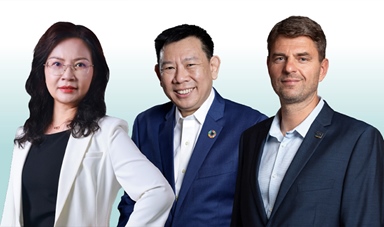Meet 12 game-changers supercharging finance's future

1. The Sustainability champions
Image: from left, Dr Kathy Yang FCPA, Eugene Wong FCPA and Alex Kabysh CPA
Dr Kathy Yang FCPA
Partner of Sustainability & Climate, Deloitte China
Shanghai, China
When President Xi Jinping announced China’s commitment to peak its emissions before 2030 and achieve carbon neutrality by 2060, Dr Kathy Yang FCPA was in the right place at the right time. She had precisely the skills required to help organisations shape their climate goals.
Yang has a PhD in economics (on climate policy) from The Australian National University and more than two decades of academic and industrial experience in climate policy and sustainability consulting in Australia and China.
“My PhD thesis focused on the environmental implications of China’s energy use,” she says. “This was in 2005, which was also the year when the first international emissions trading system (ETS) was set up, and my thesis included a case study about a hypothetical ETS model for China.
“Very few scholars were focusing on this topic at the time, but so much has happened since then in terms of China’s environmental policies,” Yang adds. “China launched its national ETS framework in 2021 — 16 years after I started my thesis.” Yang began her sustainability consulting career in Perth and returned to China in 2013.
“When I relocated to China, I could see a gap in terms of sustainability knowledge and experience,” she says. “Not many businesses talked about how to address their climate issues at that time. It’s very different today, and I encourage businesses to integrate their ESG strategy into their business strategy.”
Throughout her career, Yang has led global teams to deliver a range of projects involving climate policy, ESG strategy and reporting, climate risk assessment, and greenhouse gas accounting and management.
“As many Chinese organisations are working on projects in overseas countries, they need to understand international climate context and regulations,” she says. “I feel excited that I can combine my experiences to help them.”
Eugene Wong FCPA
CEO, Sustainable Finance Institute Asia
Kuala Lumpur, Malaysia
How can finance leaders from 10 sovereign nations come together to agree upon a common language for sustainable economic activities?
For Eugene Wong FCPA, this task has been a highlight of his finance career. As CEO of the independent and neutral Sustainable Finance Institute Asia (SFIA), he is helping to shape ideas on sustainable finance policy and propel them into action across South-East Asia.
SFIA hosts the ASEAN Taxonomy Board (ATB), which brings together capital market regulators, central banks, finance ministries and insurance regulators in South-East Asia. The ASEAN Taxonomy for Sustainable Finance classifies sustainable economic activities, guiding the flow of sustainable capital across the region.
“It has been a successful effort. The ATB has been able to get people from diverse countries to sit at a table and agree on a credible taxonomy,” Wong says. “When we first started talking about a regional taxonomy in 2020, no one believed it could happen.”
Wong began his career as an auditor before moving to merchant banking and corporate finance. After joining the Securities Commission Malaysia in 2009, his early interest in sustainable finance was reignited.
“I was given a role to coordinate the work among the South-East Asian capital market regulators, and we decided it was important for capital markets to finance sustainability,” he says. “I’ve always believed that money makes the world go around, but there’s a good and a bad way of doing it. I wanted to contribute to the stewardship of resources, so I chose a career in finance.
“We need to be able to finance sustainability, because there’s only one earth and we only have one society,” adds Wong. “But we must be pragmatic, lofty goals are not always achievable. We need to be practical yet never lose sight of credible goals.”
Alex Kabysh CPA
Senior manager, Climate and Sustainability Reporting, ASB Bank
Auckland, New Zealand
For Alex Kabysh CPA, non-financial disclosures provide a window into operational efficiency, risk management and long-term business resilience. “Businesses today are more aware of how they can operate sustainably. Resources are becoming limited, and we need [to do] some deep thinking about futureproofing business models,” he says.
Kabysh moved to New Zealand from Belarus almost two decades ago and spent his early career working in group finance and transformation roles.
“It started to feel repetitive, and I began to think about where else I could apply my skills,” he recalls. “I’ve always been passionate about the non-financial aspects of business, like environmental, social and ethical responsibilities, and I knew it was an area where accountants could make a difference.”
Prior to his role at ASB Bank, Kabysh held an ESG management role in the quick-service restaurant industry, where he honed his skills in non-financial disclosures. His current role is centred around the preparation of ASB’s annual climate statements, making sure compliance is met and due diligence processes are followed, as well as calculating and validating group emissions.
“There are also opportunities to work with other teams on environmental and social policies, initiatives or strategies,” he says.
Kabysh sees the alignment of international climate reporting standards as one of the greatest challenges and opportunities in non-financial disclosures.
“Understanding biodiversity and social impact is the strategic goal for many organisations,” he says. “We’ll need more, and better quality, data to enable strategic decision-making. Hopefully AI will help in terms of capturing and processing it.”
While climate reporting generally follows the same cycles as financial reporting, Kabysh says no two days are alike.
“I’ve learned so much in just a few years,” he says. “It’s an exciting time to be working in sustainability, but I’d recommend sharpening your soft skills, because it’s a team game.”
